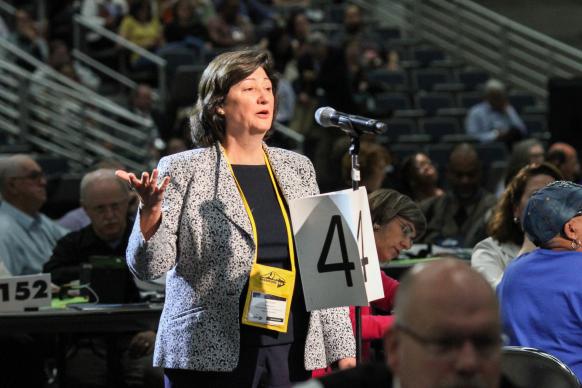General Conference voted to stay at the corporate table in order to influence investors.
Fossil fuels
SAM HODGES
United Methodist News Service
After prolonged, impassioned debate, General Conference 2016 chose not to add a fossil fuels investment screen for the United Methodist Board of Pension and Health Benefits.
The question came down to divestment vs. engagement as the better way to use church investments in influencing energy companies to address climate change.
A minority report with the fossil fuels screen lost 258-461. Ultimately, the legislative committee-approved petition without that screen was supported by delegates overwhelmingly.
Delegates heard from Barbara Boigegrain, top executive of the Board of Pension and Health Benefits, who described the climate change issue as “urgent” but argued against a fossil fuels screen.
She said the denomination would have more influence by working on the inside to change corporations’ behavior.
“If we divest with companies, The United Methodist Church loses a voice at the table,” Boigegrain said.
Settlements in occupied lands
ERIK ALSGAARD
United Methodist News Service
An amendment offered during debate on socially responsible investing that sought to divest from illegal settlements on occupied lands failed 559-167. But General Conference delegates on May 20 adopted a petition on behalf of a Palestinian village, Wadi Foquin.
Earlier during General Conference, the Finance and Administration Legislative Committee failed to support any petition calling for divestment from companies doing business in Israel.
Speaking for the amendment, Janice Nelson, a lay delegate from the Oregon-Idaho Conference, said that staying at the table and pleading with companies to be socially responsible is not working.
“There are companies that are invested in profiting from the occupation of Palestine that we have been talking to for many, many years,” Nelson said. “I would not ask us to divest from anybody until we had done the shareholder advocacy, but that has gone on and on with no results. It’s time to say that we do not profit from the occupation of another people’s lands, which is exactly what is going on. This is not anti-Israel; it’s not anti-Jewish; it’s anti-occupation.”
The Rev. Alex Joyner, a reserve delegate from the Virginia Conference, said that divestment is unfair to Israel as it targets one party as a “bad actor” in the situation.
“Divestment is built on the notion that Israel alone is responsible for the situation of the occupation, and that Israel, alone, can end it,” Joyner said.
Last Updated on December 22, 2022

